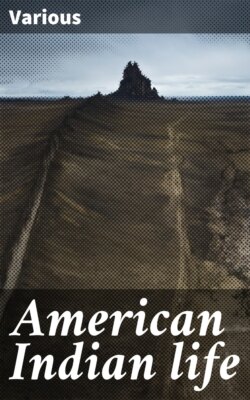Читать книгу American Indian life - Various - Страница 12
На сайте Литреса книга снята с продажи.
VI
ОглавлениеTable of Contents
The people were gathered near the mouth of the Bighorn. There was merriment in camp after a successful hunt. Suddenly was heard the beating of a drum and the chanting of a strange song. All ran out of their lodges to see what was going on. Who is that man on the richly fitted-out horse? He approaches the center of the circle, shaking a rattle. Two sashes of deerskin, slipped over his head, descend to the ground. Sliding-beaver is leading the horse, halting from time to time, and beating a drum. At the fourth stop he cried aloud: “Young women, if you would be this man’s sweethearts, you must hasten, he is about to die!” Then he beat his drum and addressed the rider: “Remain on horseback, do not dance!”
Forthwith Takes-the-pipe dismounted and danced in position. Then because he did the opposite of what he was told everyone knew him for a Crazy Dog pledged to court death. Straightway Pretty-weasel began to lament: “I begged him not to do it; he has done it!” But the other women cheered lustily, and Sliding-beaver sang his praises aloud as he slowly led him outside of the camp circle.
Then for a while he appeared every evening, dancing and shaking his rattle. He would ride through camp like a madman. When a few were gathered eating some meat, he would walk his horse into their very midst as if to run over them. Then they would cry out, “Trample on us.” And the Crazy Dog would turn aside and let them eat in peace. At night the best-looking young women paid him visits; even married women went there and their husbands did not mind it. Sometimes two or three would come of a single night. Famous Whistling-waters came to tell him what a great thing he was doing. All the eminent warriors in camp, Drags-the-wolf, Red-eye, and Shinbone, were looking on him with envy.
The cherries had ripened and one day a woman offered him some. He said, “When I decided to do this, the grass was sprouting. I did not expect to live so long, yet to-day I am eating cherries. Well, I will see whether I can achieve what I wish.” When they went hunting the next time, he got some buffalo blood and mixed it with badger blood and water. In the mixture he saw his image with blood streaming down his face. “Yes,” he cried, “I have seen it. What I am longing for is coming true!”
The leaves were turning yellow when a tribesman caught sight of some Dakota raiders. The young men drove them off and the enemy took refuge in the dry bed of a stream. There, the Crow warriors were going to attack them. They were getting ready when Pretty-weasel rushed into their midst, crying, “Bind my son! Don’t let him go!” They looked for him. He was not to be found. All alone he was dashing toward the enemy. They galloped after him. He was close to the coulée, shaking his rattle and singing his song:—
Sky and earth are everlasting,
Men must die.
Old age is a thing of evil,
Charge and die!
He rode straight up to the enemies’ hiding-place. At the edge he dismounted. Several Dakotas were peeping out. “There is no way for me to live,” he cried, “I must die!” He shot one foe and struck him with his rattle. Then another Dakota shot him in the left temple, and Takes-the-pipe fell dead.
The Crow warriors caught up, and killed every man in the raiding party. Pretty-weasel reached the spot and wiped the blood from her son’s forehead. The men put him on a horse and brought him to camp. Wailing, they went home. There the Sore-lip women clipped their hair and gashed their legs. The Whistling-water men rode up and down singing the praises of the dead Crazy Dog. His fellow-Foxes propped up the corpse against a backrest, knelt before it and wailed. Their officers ran arrows through their flesh and jabbed their foreheads till the blood flowed in streams. Then they set up a scaffold on four posts, wrapped the body in a robe, and placed it on top. Beside the stage they planted a pole. From it was hung his drum, and his sashes swept down as streamers blowing in the wind. His rattle they put into his hand. Then the camp moved.
Robert H. Lowie
